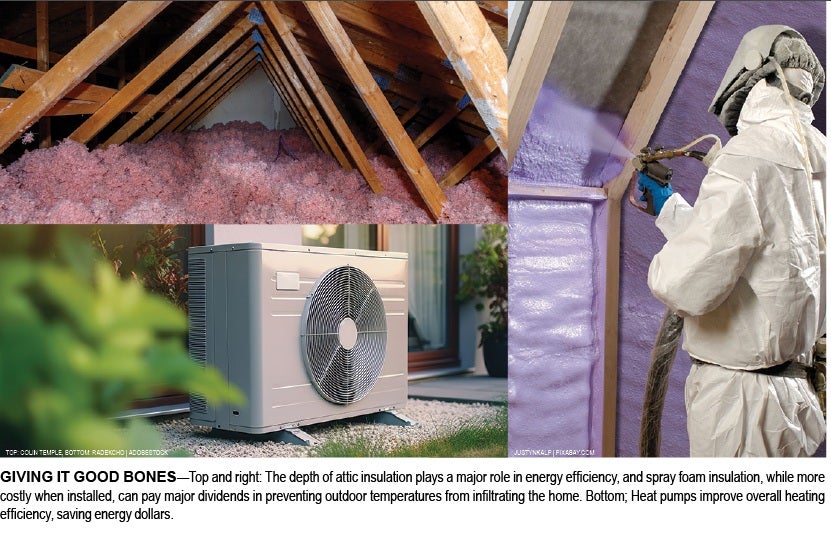That brand new home may have all the latest
bells, whistles and stunning curb appeal.
But does it measure up for maximum energy efficiency?
by
ERIC COMPTON
With the growth of new construction homes that’s occurred during the last several years—especially within United’s service territory—energy efficiency is a key factor to consider during the home-buying process.
When evaluating the energy consumption of an all-electric home, the analysis typically breaks down into three main categories. About 50 percent of the energy bill is heating and cooling, 20 percent for water heating and 30 percent is used for everything else (lighting, refrigeration, electronics).
This breakdown highlights that roughly 70 percent of a home’s energy use is driven by just two major components. By reducing the runtime of these systems, or investing in more energy-efficient products, homeowners can achieve substantial savings.
Investing in high-efficiency products early in the construction process makes a noticeable difference in long-term energy savings. Advances in technology continue to bring new products that enhance both comfort and efficiency, helping homeowners save money.
 When considering a newly constructed home, several elements contribute to maximizing energy efficiency. Look for homes with high-efficiency HVAC systems, such as heat pumps with high SEER2 (Seasonal Energy Efficiency Ratio 2) and HSPF (Heating Seasonal Performance Factor 2) ratings. Ensure the home has advanced and adequate insulation, particularly spray foam insulation, which provides an airtight seal that prevents excessive heat loss or gain.
When considering a newly constructed home, several elements contribute to maximizing energy efficiency. Look for homes with high-efficiency HVAC systems, such as heat pumps with high SEER2 (Seasonal Energy Efficiency Ratio 2) and HSPF (Heating Seasonal Performance Factor 2) ratings. Ensure the home has advanced and adequate insulation, particularly spray foam insulation, which provides an airtight seal that prevents excessive heat loss or gain.
High-efficiency windows and doors with double or triple glazing are essential to reduce energy waste. Energy-efficient appliances, such as those with the Energy Star label, should also be prioritized. Additionally, consider smart home technologies like smart, Wi-Fi-enabled programmable thermostats to optimize energy use. The Wi-Fi option provides users the ability to modify temperature settings when they’re away from the home.
Space conditioning (heating and cooling) is the largest energy consumer in most homes, making the selection of efficient heating and cooling units key to achieving optimal performance without wasting energy.
For all-electric homes, there are two primary types of electric heating systems: electric resistance heating and heat pumps. Electric resistance heating, which can be less costly to purchase and install on the front end, passes electricity through coils to heat the air. However, this process is inefficient and often results in higher—often shockingly—winter energy bills. In contrast, heat pumps transfer heat rather than generating it, making them a much more energy-efficient option.
Recent advancements have improved heat pump systems, particularly mini-split or ductless units that use inverter technology for efficient heating and cooling. Many of these systems can achieve a 20+ SEER2 rating, making them a cost-effective choice for heating or cooling individual rooms.
Mini-split technology continues to evolve. Mini-split heat pumps can now be paired with traditional air handlers and existing duct work, allowing the heat pumps to heat and cool entire homes efficiently, not just one open space. Furthermore, cold climate mini-split heat pumps are much more efficient than earlier models. These models offer a significant advantage over traditional heat pump systems, which tend to switch to auxiliary heat when temperatures drop below 30°F.
In regions where temperatures rarely fall below minus 22 degrees F, cold climate heat pump systems can operate efficiently in low temperatures, avoiding unnecessary energy consumption typically associated with auxiliary heat.
In addition to heating and cooling, another important consideration for new homes is the 2025 refrigerant change. The phase-out of current refrigerants like R-410A will be replaced by more eco-friendly alternatives, such as R-454B and R-32. This follows the earlier phase-out of R-22 refrigerant, which led to price increases as production decreased.
As R-410A becomes harder to find, prices are expected to rise. Homeowners should ensure that their new HVAC systems are compatible with these newer refrigerants to avoid future issues or the need for early replacement due to refrigerant shortages.
Insulation is another key factor in improving a home’s overall energy efficiency. The United Energy Solutions team maintains that insulation levels, especially in the attic, are among the most important elements in maintaining year-round energy efficiency. Proper insulation ensures a home stays warm in the winter and cool in the summer without excessive energy waste.
To achieve optimal insulation, United recommends 17 inches of blown fiber, 10 inches of cellulose, or 5.5 inches of spray foam to meet the standard R-38 insulating value. Spray foam insulation provides an airtight seal that helps maintain consistent indoor temperatures and prevents heat infiltration.
While it may have a higher initial cost compared to traditional blown insulation, its long-term energy savings makes it a valuable investment. Sealing the attic and walls with spray foam also reduces energy waste through air leaks, decreasing the overall demand on the HVAC system.
Water heating, which accounts for about 20 percent of a home’s total electricity usage, is another major contributor to energy consumption. Heat pump water heaters are a particularly efficient option for water heating located within an unconditioned area of a home. These units use electricity to move heat rather than generate it, making them three times more efficient than traditional electric resistance water heaters, according to the U.S. Department of Energy.
While the initial cost of a heat pump water heater may be higher than a conventional unit, the long-term savings on energy bills can quickly offset the investment. Additionally, United offers a $150 rebate to encourage the installation of these efficient systems.
In conclusion, energy efficiency should be a top priority when planning the construction of a new home. By integrating energy-saving solutions from the beginning, homeowners can significantly reduce their energy consumption and lower monthly utility bills. Though the up-front costs of energy-efficient products may be higher, the long-term savings generally make them a wise investment. Members are encouraged to consult with United to speak with an Energy Solutions Specialist, explore available incentives, or schedule an energy audit. Members can learn more about energy efficiency by exploring United’s Energy Audits and Rebates programs.


